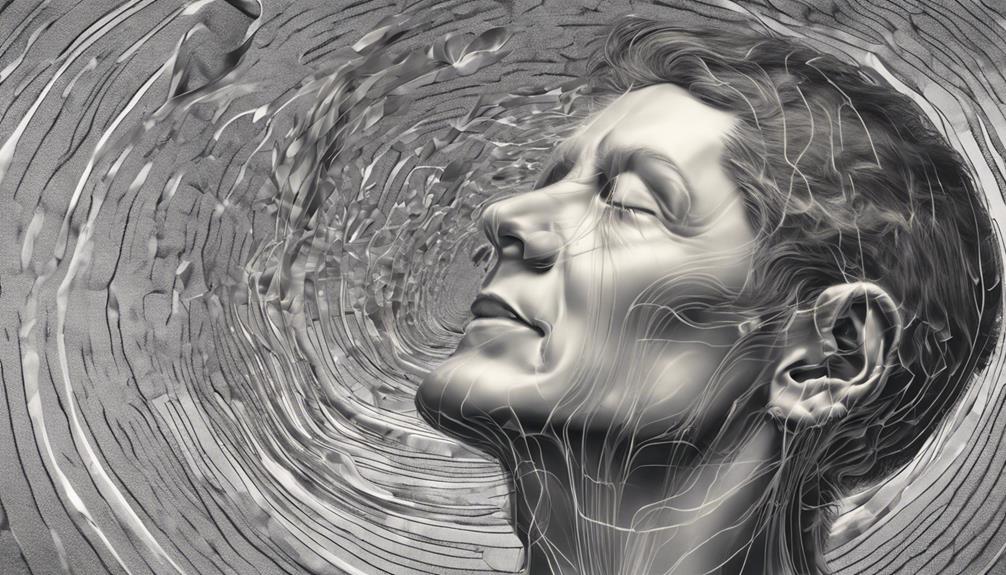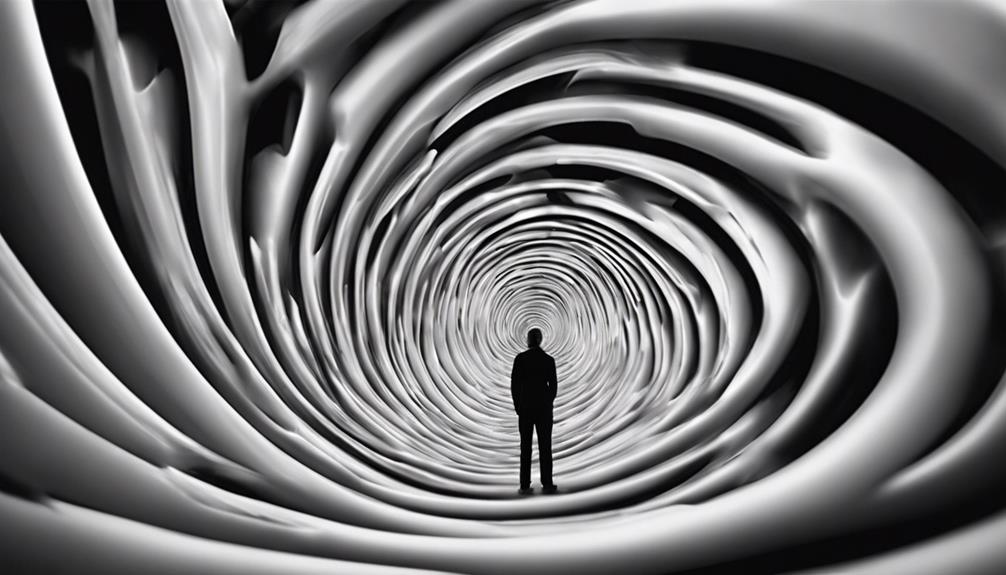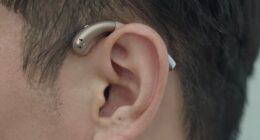Let’s delve into the intricate relationship between hearing loss and vertigo, shedding light on the specific mechanisms that tie these seemingly unrelated symptoms.
The connection between the two goes beyond mere coincidence, hinting at a deeper interplay within the inner ear that warrants closer examination.
As we navigate through the complexities of how hearing loss can trigger vertigo, we will uncover surprising insights that challenge conventional wisdom and pave the way for a deeper understanding of these intertwined conditions.
Key Takeaways
- 3 out of 4 cases of vertigo are linked to hearing issues, emphasizing their strong connection.
- Sensorineural hearing loss disrupts the vestibular system, affecting balance and equilibrium.
- Understanding vestibular disorders like BPPV and Meniere's disease is crucial in managing vertigo.
- Trauma can lead to interconnected symptoms of hearing loss and vertigo, necessitating multidisciplinary care.
Understanding Vertigo and Hearing Loss Connection
We've found that the connection between vertigo and hearing loss is a common occurrence, with 3 out of 4 cases of vertigo being associated with hearing disorders.
The inner ear plays a crucial role in both hearing and balance, with disruptions in this intricate system often leading to symptoms like vertigo. Conditions such as Meniere's disease, which affects the inner ear's vestibular function, can cause episodes of vertigo accompanied by hearing loss.
Tinnitus, a ringing or buzzing sensation in the ears, is another symptom linked to the vestibular system that can contribute to vertigo. Additionally, underlying brain issues or vestibular disorders can manifest as both hearing loss and balance problems, further emphasizing the intricate relationship between these sensory functions.
Proper diagnosis is essential in untangling the complexities of vertigo and hearing loss, as understanding the underlying cause is crucial for effective management strategies.
Impact of Sensorineural Hearing Loss

The impact of sensorineural hearing loss extends beyond auditory impairment, influencing the body's equilibrium and potentially leading to vertigo symptoms due to shared neural pathways. When considering sensorineural hearing loss and its implications for vertigo, several key points emerge:
- Vestibular System Affected: Sensorineural hearing loss can disrupt the vestibular system, responsible for maintaining balance and spatial orientation.
- Interconnected Inner Ear Structures: Damage to the inner ear structures involved in both hearing and balance can disrupt the delicate equilibrium of the body.
- Hair Cell Vulnerability: The hair cells in the inner ear, crucial for both hearing and balance functions, may be susceptible to the same underlying conditions causing sensorineural hearing loss.
- Vestibular Dysfunction: Sensorineural hearing loss often coincides with vestibular dysfunction, contributing to the manifestation of vertigo symptoms.
Understanding the intricate relationship between the auditory and vestibular systems is paramount in effectively managing vertigo associated with sensorineural hearing loss.
Exploring Vestibular Disorders
Exploring the complexities of vestibular disorders reveals the intricate interplay between the inner ear's balance system and various associated symptoms. Vestibular disorders, such as benign paroxysmal positional vertigo (BPPV) and Meniere's disease, can disrupt the delicate mechanisms responsible for maintaining balance and spatial orientation. These conditions often manifest through symptoms like vertigo, dizziness, imbalance, and nausea, significantly impacting an individual's quality of life. To diagnose specific vestibular disorders, healthcare professionals may conduct vestibular testing, including maneuvers like the Dix-Hallpike test. Once diagnosed, treatment options for vestibular disorders vary and may include maneuvers, medications, rehabilitation therapy, and in severe cases, surgical interventions to alleviate symptoms and restore balance. Understanding the connection between vestibular disorders and symptoms like vertigo is crucial in providing targeted and effective interventions to improve patients' overall well-being.
| Vestibular Disorders | Description | Common Symptoms |
|---|---|---|
| BPPV | Characterized by brief episodes of vertigo triggered by specific head movements | Vertigo, dizziness |
| Meniere's Disease | Involves recurrent episodes of vertigo, hearing loss, tinnitus, and a sensation of fullness in the ear | Vertigo, hearing loss |
| Vestibular Testing | Diagnostic procedures like the Dix-Hallpike maneuver assess inner ear function and help identify specific vestibular disorders | Dizziness, imbalance |
Uncovering Trauma and Hearing Loss

Uncovering the relationship between trauma and hearing loss sheds light on the potential impact of inner ear damage on vertigo symptoms. When trauma occurs to the head or ear, it can disrupt the delicate structures of the inner ear, leading to issues with both hearing and balance mechanisms.
- Trauma Effects: Injuries such as skull fractures or concussions can directly affect the cochlea or vestibular system, resulting in hearing loss and vertigo symptoms.
- Diagnostic Tools: Imaging studies like CT scans play a crucial role in assessing the extent of inner ear damage caused by trauma, aiding in accurate diagnosis and treatment planning.
- Multidisciplinary Care: Managing traumatic-induced hearing loss and vertigo often necessitates a collaborative approach involving specialists like otolaryngologists and neurologists for comprehensive care.
- Cascade of Symptoms: Inner ear damage from trauma can set off a chain reaction of symptoms, underscoring the interconnectedness of hearing loss and vertigo in such cases.
Managing Vertigo With Hearing Loss
Managing vertigo alongside hearing loss requires a coordinated effort involving ENT specialists and audiologists. When addressing vertigo symptoms in individuals with hearing loss, treatment options such as hearing aids or cochlear implants may be recommended to enhance hearing function and alleviate the impact of vertigo.
Additionally, vestibular rehabilitation therapy plays a crucial role in improving balance and reducing vertigo symptoms in this population. Incorporating lifestyle modifications, such as identifying and avoiding triggers, as well as maintaining a healthy diet, can further support the management of both vertigo and hearing loss.
Regular follow-up appointments with healthcare providers are essential to closely monitor progress and make necessary adjustments to treatment plans for optimal management of vertigo and hearing loss. By utilizing a multidisciplinary approach that leverages the expertise of ENT specialists and audiologists, individuals can effectively navigate the challenges presented by concurrent vertigo and hearing loss.
Frequently Asked Questions
Is There a Connection Between Hearing Loss and Vertigo?
Yes, there's a strong connection between hearing loss and vertigo. Inner ear problems, brain issues, and conditions like Meniere's disease can cause both. Tinnitus, a symptom related to the inner ear, can also contribute.
Hearing aids don't cause vertigo, but underlying conditions might. Understanding this link is crucial for diagnosis and treatment.
How Do I Know if My Dizziness Is From My Ears?
When figuring out if dizziness stems from the ears, pay attention to signs like tinnitus, ear pressure, and hearing loss. These symptoms may point to inner ear issues causing vertigo.
Seeking medical evaluation is crucial for proper diagnosis. Specialists can assess inner ear function and vestibular system irregularities to determine the root cause of dizziness.
Understanding these indicators can lead to effective treatment strategies tailored to your specific condition.
Can Clogged Ears Cause Vertigo?
Yes, clogged ears can indeed cause vertigo. When ear blockages disrupt the balance of fluids in the inner ear, it can lead to vertigo symptoms.
Conditions like Eustachian tube dysfunction or earwax buildup can contribute to ear clogging and trigger vertigo episodes. Addressing the underlying cause of the clogged ears is crucial in managing vertigo associated with ear blockages.
Treatment for clogged ears may help alleviate vertigo symptoms related to the blockage.
What Are 3 Symptoms of Meniere's Disease?
Symptoms of Meniere's Disease include:
- Sudden vertigo attacks, lasting 2-3 hours
- Fluctuating hearing loss
- Commonly experienced tinnitus and ear pressure
These symptoms can be intense, often leading to nausea and dizziness. Monitoring closely for these signs and seeking timely medical attention is crucial for managing this condition effectively.
Conclusion
In conclusion, the connection between hearing loss and vertigo is like a tangled web, with one often leading to the other. Understanding this relationship is crucial in managing both symptoms effectively.
By addressing the root cause of hearing loss, we can potentially alleviate vertigo and improve overall quality of life. Just as a puzzle piece fits perfectly into place, proper treatment can help restore balance and harmony to our senses.











